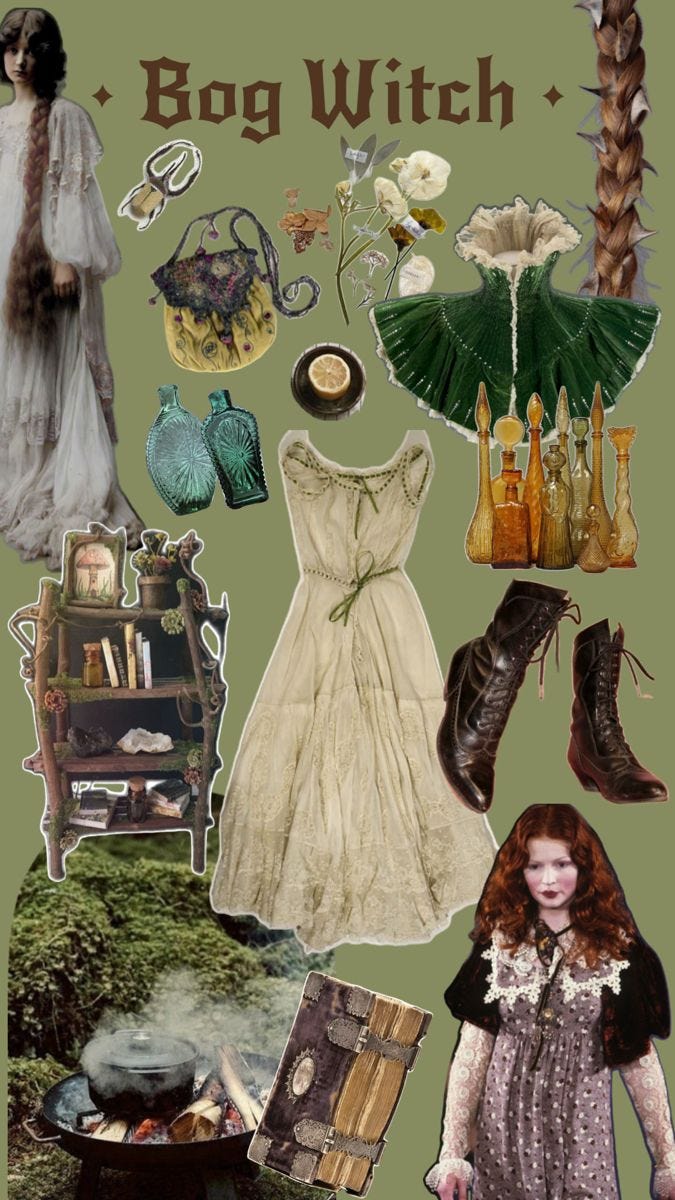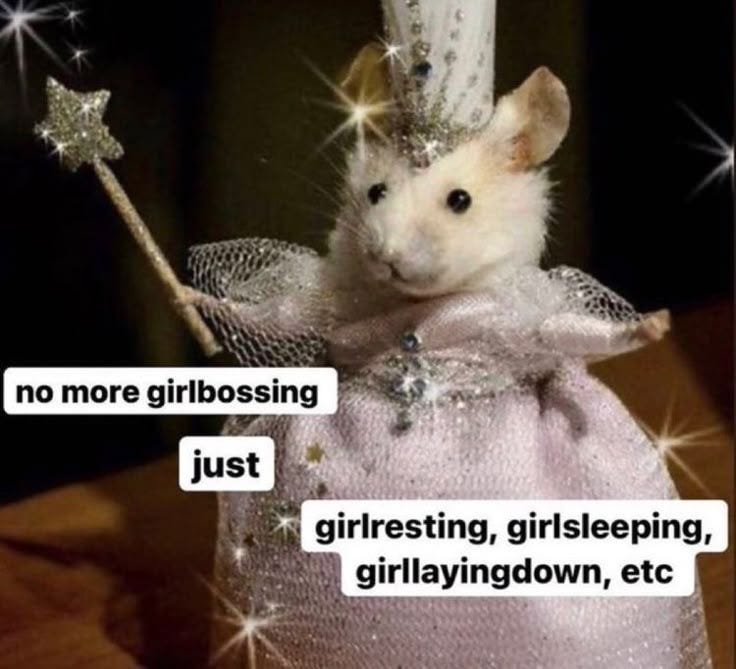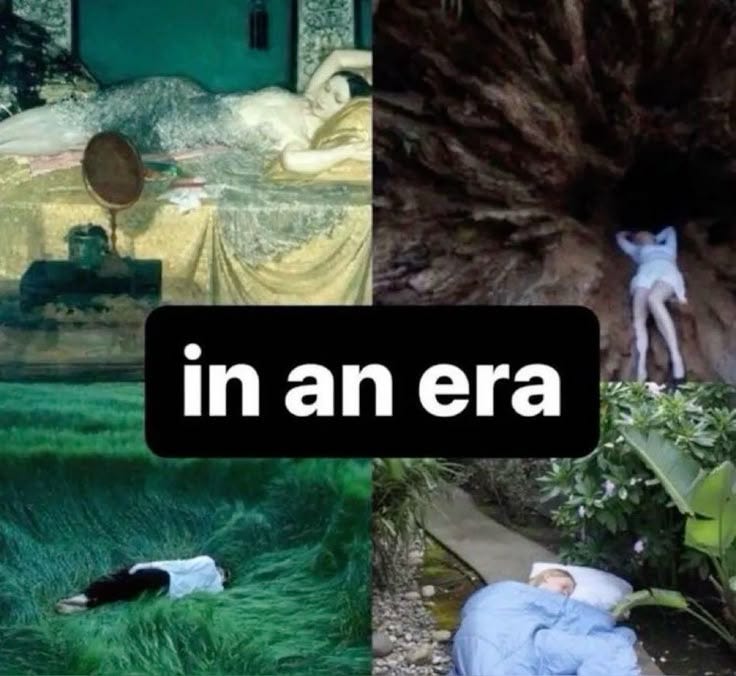It's Hot Bog Witch Summer, and I'm Doing Nothing
Muggy music; WW3 outfits; an essay on Chronic Doing
It’s officially happening. The world’s on fire. We’re living in a tropical climate. Well, it’s not “official” official, but it fucking feels like it. It’s hard not to leave the house and think, Okay, this is the beginning of the end when it feels like a greenhouse/oven outside. I wonder how soon Philadelphia will follow NYC’s footsteps and be reclassified to a humid subtropical climate zone. At least I could start growing avocados.
Here’s how I’ll be coping with this hot summer:
Evoking my Bog Witch energy (morphing into a slug; training mosquitos to drink the blood of my enemies; catching catfish with my bare hands to give them forehead kisses)
Developing my WWIII personal brand
 Tiktok failed to load.
Tiktok failed to load.Enable 3rd party cookies or use another browser
Listening to Ethel Cain’s new album (the prequel to her romantic full-length, Preacher’s Daughter, about a girl who gets cannibalized by her lover) and nothing else, out August 8:
Rest or Die Doing
Last night, I lay in bed and watched the lighting storm outside the window, after getting home from celebrating my grandmother’s 91st birthday—we ate frozen pizzas and watched Wicked (my third time; her first—she loved it!).
I watched the storm as I thought about what to do with myself next. I could read, write, play Stardew Valley (but I really shouldn’t!). In that quiet moment, it became clear that I was doing exactly what was needed. The day was packed with high stimulation—the oppressive 100° weather + subtropical Philly humidity, the smell of Nag Champa from the shop where I bought my grandmother a tiny lapis lazuli cat, and Ariana’s operatic high notes in “No One Mourns the Wicked.” I needed rest.
Oh, this is new, I thought, feeling the calm wash over my body. This kind of calm was something I’ve been working towards for months.
I drifted off to sleep with the bright flashes behind my eyelids.
Rest like this never used to come easy, which is common for people with mental illness. I used to toss and turn with a busy mind almost every night, and I would spend hours in a day actively dissociating, daydreaming about my crushes or romantacy stories. Before my mental health crisis last year, I used to ask myself questions like:
Why do I daydream so much? Is that bad?
How do I fall asleep better?
How do I stop my mind from thinking so much?
Eventually, I learned that overthinking is a trauma response. Thinking distracts ourselves from feeling, and who wants to feel big bad feelings, right? It takes mindfulness, acceptance of feeling, and rest to break the spell of a busy mind. But as with anything, practice makes progress. I’ve been practicing mindfulness for over a year, and Radical Rest for just under that. Last night, I finally felt its rewards. That storm reminded me: true rest—not numbing or zoning out, but actual restorative acts of doing nothing—is both deeply personal and radically political.
We can’t afford to do nothing anymore. You can take this and run with in so many directions—to protecting our immigrant communities, protesting the genocide in Gaza, fighting the Oligarchy, defending the rights of transgender folx, and working our asses off to afford healthcare, childcare, a home in a market that is quintessentially fucked. You know this. I don’t need to get on my high horse here and preach to the choir. (Can you imagine a preacher on a horse, riding around the church to give their sermon? That’d be so cool.)
What feels right for me right now is to remind you that we can do all these things and must prioritize rest. Sometimes we have to do NOTHING. You may know this too, but are you really practicing this? Too often I’m witnessing people I love struggling to pause and catch their breath. I’m concerned.
I am in a chapter of my life requiring doing; it is probably the most financially precarious chapter of my life (second only to when I was 18, attending a swanky design school in New York City, one month from semester’s end and already out of my meal plan, spending $10 on boutique oatmeal breakfasts, and about to wrack up 60k in student debt before transferring). I lost my job in October 2024 and went on disability. Now that I need money, I need to be doing. (I’m not saying this—the insurance company covering my long-term disability is saying this.)
Even as I chase jobs and side hustles, I'm unlearning the lie that rest must be earned. I am at my most financially responsible and proactive because I have no choice. Beyond applying to dozens of jobs, I’ve considered and attempted all the side hustles—crafts business, OnlyFans, this website (thank you, subscribers <3). Next attempts: animal portraiture and smutty fiction (maybe published on my personal Substack…
… go follow <3) I love the doing of these things, but I’m shitting where I’m eating. Balancing it all, while returning to work part-time and still in recovery, I want to do NOTHING*.*By “nothing,” I mean, anything driven in the pursuit of profit, for myself, and especially for “the boss.”
It’s become mainstream (at least in my social bubbles) to recognize this “hustle culture”—our capitalist socialization to constantly produce and consume. Many of us feel guilty when we do nothing: when we rot in bed on a day off after working 40+ hours; when we binge watch a show instead of doing laundry, or cancel plans with a friend because we’re too drained. Rich people don’t make money while we rest.
Yes. Rest is a privilege—but only in our white supremacist industrialized capitalist patriarchal society (term adapted from cultural critic and feminist scholar, bell hooks). Disenfranchised people cannot afford to rest. For them, rest = death. Everyone is socialized to believe rest is bad and suffer the consequences for it. (Just last week, a pizza shop waiter told me she’d be fired if she missed her shift, even with no AC during a heat wave). We’re taught to believe rest must be earned. But it isn’t, nor is it punishable. At its essence, rest is a right.
I’ve seen the way hustle culture has demanded so much from my working class family. It’s taken their bodies from them. They suffer from pains built up over years of overuse. They believing peace will be earned in retirement. I see this as a curse; I don’t subscribe to toiling away over half of my existence, compromising my happiness for money. Yes, it is necessary to take the side gig for extra cash to pay the electric bill. But there must be balance. Some things need to be turned down for the sake of your body and mind. “No” is a spell that protects your inner safety.
Rest itself doesn’t always feel safe. When we rest, the big bad feelings (the pain, grief, sadness, fear, anger, resentment, etc.) bubble up and we don’t like it. We keep doing to avoid them. Chronic doing is a trauma response, just as overthinking is. It keeps us busy enough to run away from our feelings. But they catch up eventually. Rest is a practice. It isn’t always comfortable, but it gets better.
There’s been a surge in calling out hustle culture by cultural critics. Journalist Evie Muir discusses burnout, specifically for Black, queer, disabled activists of color, in their book Radical Rest: Notes on Burnout, Healing and Hopeful Futures (2024). Caroline Dooner discusses it as a result of cultural self “betterment” in Tired As Fuck: Burnout at the Hands of Diet, Self-Help, and Hustle Culture (2022). It’s been six years since author Jenny Odell’s How to Do Nothing: Resisting the Attention Economy was published and widely received, with tens-of-thousands of reviews on Goodreads, and hitting numerous bestseller lists, including New York Times, The New Yorker, and Time Magazine. Odell’s message to reclaim our time and attention, especially in the digital age, has been whispered down the lane for a long time (at least from what I’ve witnessed in my especially liberal-to-socialist-leaning social circles). Kara Loewentheil, Master Feminist Coach, founder of The School of New Feminist Thought, author of Take Back Your Brain (Penguin, 2024), and host of podcast UnF*ck Your Brain: Feminist Self-Help for Everyone endorses rest as one of two components to experience emotional happiness:
If you’re not resting, you’re operating in a state of chronic stress and possibly burnout. Women have a hard time resting because of the socialization we get that teaches us that our worth and value come from our productivity, especially doing things for others and doing things that are part of our social roles. (“Why Rest and Pleasure Can Be Hard - But Are Keys to Being Happy,” Unf*uck Your Brain, 2024)
I agree deeply because I’ve lived it and met dozens of other folks in group therapy who have too. Almost every single person I met in intensive therapy had an over-demanding job that pushed them to the limit, as well as personal obligations that destroyed their nervous systems. While these burnouts were blessings in disguise, forcing us to extract ourselves from these stressors and practice radical rest.
Adding to Loewentheil’s statement—men, and anyone on or out of the gender binary spectrum, are socialized in some way that hinders their ability to experience rest in its totality. Men are socialized to be the providers; to value work and success above all else. I can’t speak for trans and non-binary folx, but I imagine the disastrous attacks on their human rights takes a toll on the nervous system and makes rest difficult.
These are just some resources I encourage you (and myself—ironically, my attention span thwarted me from finishing Odell’s book years ago) to check out if you find yourself in a chronic state of doing: if rest isn’t easy to do or come by; you have a hard time saying ‘no’ to plans; if your mind is stuck in thought purgatory.
Ways that I’ve practiced Radical Rest: meditating (almost) every day, staying off of social media every first waking hour, granting myself “worry time,” spending a whole day in bed to let the anxiety run its course through my body.
I’ve gotten fairly good at doing nothing. Not that it matters whether I’m “good” at it—it doesn’t help to measure myself that way. And of course, there are always ways to grow (growth mindset, babe). But objectively, I can do nothing for longer and feel less guilt than I used to. I can wake up, drink my tea, and stare into space; I can be in a room with another person and just exist, no masking necessary; I can fall asleep in less than 20 minutes; I can be at peace with where my life is and not dream it away in a mindless fantasy; I can quiet my thinking mind. I couldn’t do this a year ago. I’m really grateful to myself for this practice. I hope we begin to see a bigger shift away from hustle culture, prioritize presence over product, and sit back to enjoy the storm.
–Bridget <3














